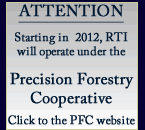Abstract
A key challenge of achieving sustainability on intensively
managed private forests is how to conserve biodiversity while
maintaining long-term economic viability. We have developed
an approach for creating management templates to help landowners
successfully meet both economic and biodiversity goals.
Our approach first identifies a desired stand condition
relative to a given biodiversity goal. Then a non-parametric,
multivariate, statistical assessment process is used to rigorously
evaluate whether management pathways will result in the desired
stand conditions. By combining this with a performance threshold
for long-term economic sustainability, the result is an integrated
assessment that can be used to identify sustainable management
strategies that meet both biodiversity and economic goals.
These strategies then become the basis of management templates,
which are a set of flexible and easy-to-use guidelines for
implementation on a variety of ownerships. This project develops
two example templates to demonstrate the broad applicability
of this approach for improving biodiversity while minimizing
negative economic impacts. The first template addresses overstocked
riparian areas in Pacific Northwest Douglas-fir plantations.
This template will encompass strategies for enhancing older
forest function within riparian buffers while maintaining
a sustainable economic return.
The second template will address understory conditions in
southern loblolly pine plantations. This template will focus
on longer rotations that produce higher value products in
light of declining pulp markets. These rotations will include
thinning strategies that improve game habitat for added hunting
lease income while also increasing understory biodiversity.
The template approach that we have established represents
a holistic methodology for defining sustainable forest management
alternatives for intensively managed private forest lands.
The end result is a set of flexible, easy-to-use management
guidelines to help private landowners meet multiple Montreal
Process criteria for sustainability, including conservation
of biodiversity, conservation of water resources, increased
carbon sequestration, and enhanced, long-term socio-economic
benefits. |







